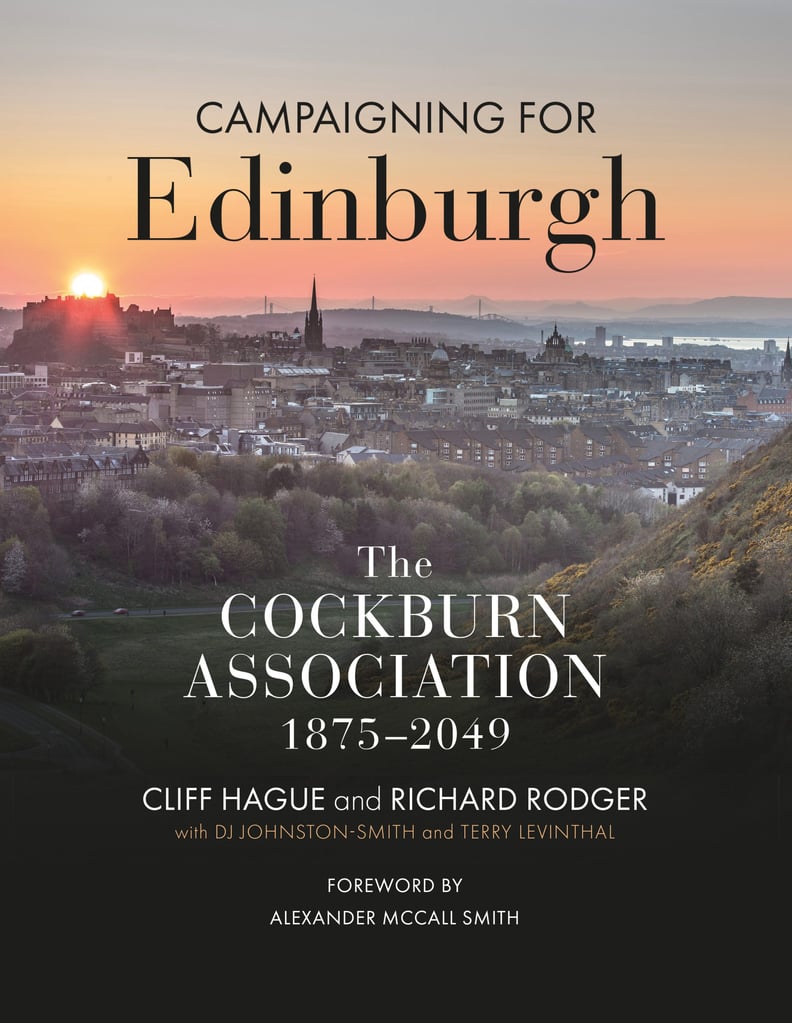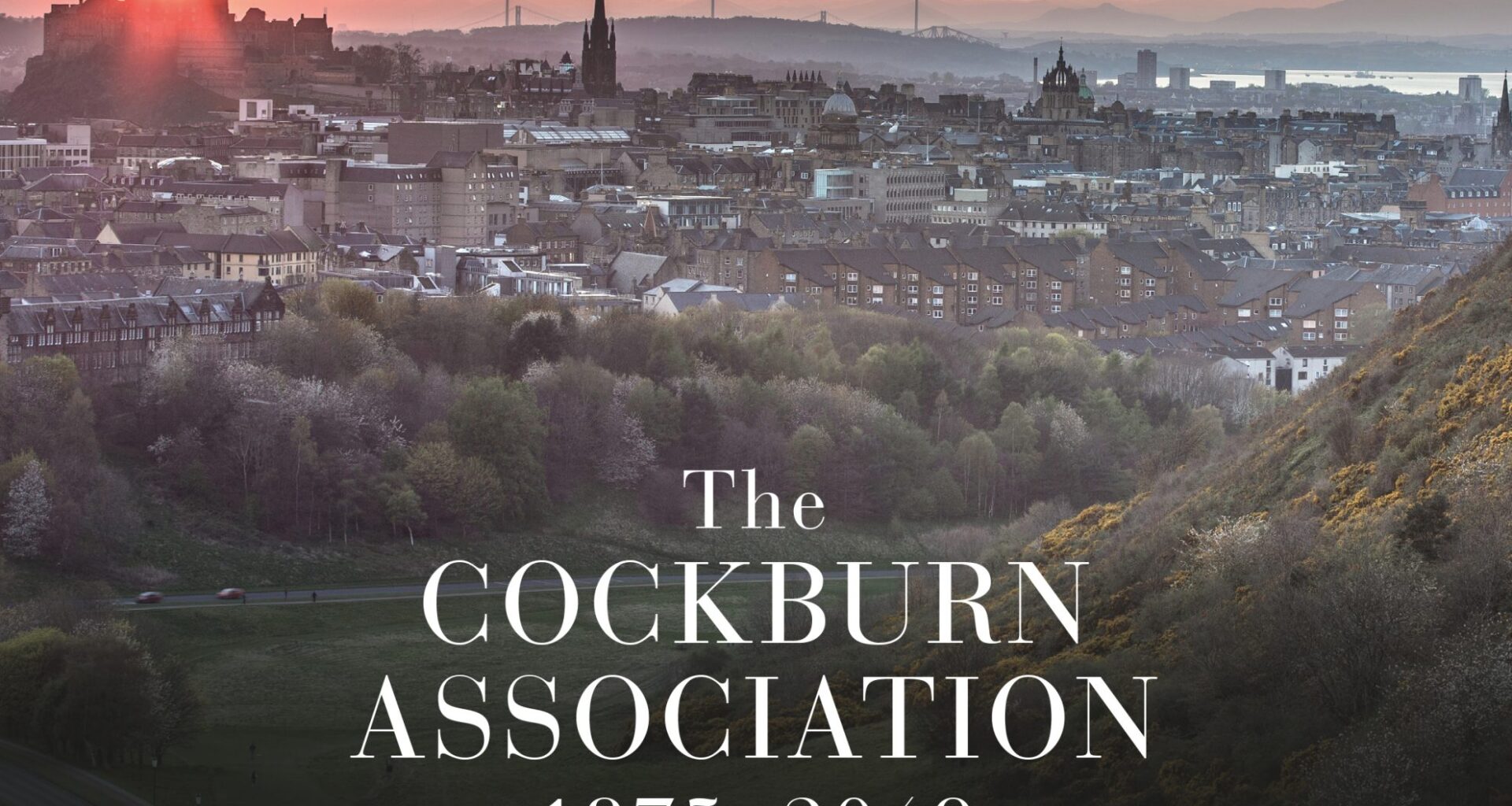The most effective public discussions confront fundamental issues head on.
This high standard was met at the Cockburn Association’s “Campaigning for Edinburgh” event this week, when the four authors of the Association’s new history – Richard Rodger, Cliff Hague, Terry Levinthal, and DJ Johnston-Smith – discussed the book’s themes and the urgent challenges facing Edinburgh.
Far from a self-congratulatory affair, the conversation tackled crucial themes such as over-tourism, ill-considered development, and deep social and economic polarisation.
In her opening remarks, Lesley Martin, the new Chair of the Cockburn, called the 150-year milestone “an amazing achievement”, expressing surprise at the body’s historic “reach and impact”. She then introduced Rowan Brown, Cockburn’s new Director, who facilitated the discussion of the “phenomenal publication”.
Historical surprises and shifting focus
The event opened with Brown asking the authors what aspects of the history had surprised them during their research. Richard Rodger was surprised by the Cockburn’s early intervention to prevent development on Holyrood Park, seeing it as an early example of the Association’s desire to protect green spaces well beyond the New Town. Cliff Hague noted that while it is easy to characterise the Cockburn as New Town dominated, their pioneering work in Piershill in the 1970s demonstrated their ability to empower working-class as well as middle-class residents.
Terry Levinthal was struck by the extent of gap sites in the city in the 1970s – up to 32 hectares of derelict land, an area greater than the original New Town – and noted that the filling of most of this land illustrates the city’s significant change. DJ Johnston-Smith noted the Association’s significant professionalisation post-war and how this increased its impact.
The nuance of objecting
Reflecting on the Cockburn’s reputation as an organisation that simply objects to proposals, the authors offered nuanced responses. Terry Levinthal argued that “saying no in some situations is an important civic act”, with the rejection of the inner ring road scheme for Edinburgh as a key example. Richard Rodger felt that saying no often meant saying yes to defending the city. He argued that resisting efforts to develop the city’s fringes was fully justified, otherwise housing might have extended “halfway up the Pentlands”. Comparisons were drawn with Glasgow, which provided many lessons on how not to enact urban change.
Cliff Hague contended that the reputation was not fully deserved, as the Association had, despite “a few lacunae” consistently looked ahead, “not just reacting”. At its best, it had a positive vision for the future and had been ‘well ahead’ on many aspects, including greening the city. The book’s authors looked ahead to the city of 2049, confirming that the Cockburn was “consistently looking forward” to what the city might become.

Learning from others v internal strengths
When asked which cities Edinburgh might learn from, the panelists offered varied views. Cliff Hague was sceptical of looking at templates or “best practices” arguing that “context and cultural specifics” differ in every city, suggesting greater value lay in small interventions. Hague introduced the compelling notion of Edinburgh as A Frankenstein City. This concept suggests that the very forces of rationalism and market capitalism which Edinburgh helped form and promote have resulted in damaging, unintended consequences. Specifically, some of the city’s “rational” urban plans and the relentless pursuit of the tourist pound have ultimately harmed the city itself. The current state of Princes Street, the focus of much negative comment could, Levinthal believed be ascribed to “market forces in operation” reflecting massive shifts in retail.
Terry Levinthal, now Director of Edinburgh World Heritage, reframed the question by suggesting that there was “much to learn from Edinburgh” pointing to the number of cities that look to it for inspiration in terms of preservation of the Old Town and its walkability. He concluded that, despite the challenges Edinburgh faces, “we are not the basket case people sometimes think”.
Countering this “boosterism” Richard Rodger suggested that the Edinburgh celebrated by Levinthal was “only 10% of it”, and the rest of the city needed greater focus, emphasising the need to “think more holistically” about those areas “where people don’t have the ear of the authorities” – in short, a more inclusive city was needed.
Richard Rodger believed there needed to be much better dialogue between those in power and general citizens, and that the Cockburn had a crucial role in “stoking this dialogue”. Too often, the majority of the Edinburgh public had been left out of key decisions.
Constraints and the road ahead
The discussion concluded with warnings for the future, including the threats (and opportunities) posed by AI. Richard Rodger reflected that ‘being a watchdog is tough,’ as the Cockburn has many constraints, ultimately lacking “financial clout”. It required this for the high level of professional expertise needed to make a real impact. Cliff Hague warned that the organisation urgently needed to involve more younger people, stating, ‘otherwise there may be no Cockburn in 2049’. The subsequent Q&A addressed the impact of AI and the state of Princes Street, which Terry Levinthal attributed largely to market forces driven by changes in consumer shopping habits.
The session effectively showcased the Cockburn’s enduring legacy as a vital, if sometimes misunderstood, voice for Edinburgh.
The historical research confirms its role wasn’t merely reactive opposition but one rooted in a positive vision for the city – protecting its unique character, supporting its diverse communities, and championing green spaces.
Ultimately, the call to action for the future is clear: to move beyond celebrating the 10% of celebrated Edinburgh and embrace a more holistic and inclusive engagement with the entire city, ensuring that this crucial civic dialogue continues well beyond its 150th year.
Like Loading…
Related
